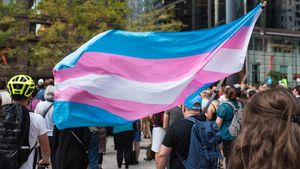The two top-ranking legal officials in Nevada will no longer defend the state's constitutional prohibition on same-sex marriage, according to a brief filed Monday.
In a brief filed with the U.S. Ninth Circuit Court of Appeals, Nevada's Democratic attorney general. Catherine Cortez Masto. writes that since the marriage equality case, known as Sevcick v. Sandoval, was first decided in federal district court in November 2012, "the legal landscape has changed." Nevada governor Brian Sandoval, a Republican, signed on to to Masto's request to remove his office from the state's defense of the ban.
The change in legal landscape to which Masto's brief refers is based on a recent finding by the same federal appeals court that determined sexual orientation to be a "suspect classification," like race, religion, or national origin, meaning laws that infringe on the rights of sexual minorities are subject to heightened scrutiny in the courts.
That decision, which determined that jurors could not be excluded from cases solely because of their sexual orientation, increases the burden of proof the state must meet to defend the constitutional ban on marriage equality, which was approved by 67 percent of Nevada voters in 2002.
"After thoughtful review and analysis, the State has determined that its arguments grounded upon equal protection and due process are no longer sustainable," Masto said in a statement Monday, according to BuzzFeed.
Masto, in her official capacity and representing her office and the governor's, also asked the court to rescind a brief filed last month that defended the state's discriminatory marriage policies, notes ThinkProgress. That 55-page brief recycled tired arguments in opposition to marriage equality and listed same-sex unions along with bigamy and incest as "what marriage is not."
The federal court could decline Masto's request to reverse the state's official position regarding the law, but even if the attorney general and governor decline to defend the law, the case already includes defendant-intervenors from the Coalition for the Protection of Marriage, who will continue to argue in favor of existing law as the case moves forward. ThinkProgress reports that the brief filed by those defendant-intervenors argued that marriage equality is comparable to white supremacy.


















































































